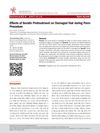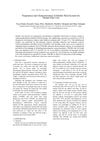
The research developed a human hair keratin and silver ion hydrogel that could help heal wounds.
 January 2024 in “Archives of Biological Sciences (Beograd)”
January 2024 in “Archives of Biological Sciences (Beograd)” AP collagen peptides may help hair grow better and become stronger.
 December 2023 in “Chiwi'saeng'gwa haghoeji”
December 2023 in “Chiwi'saeng'gwa haghoeji” Hair keratin protein might help heal mouth wounds faster.
 December 2023 in “Royal Society of Chemistry eBooks”
December 2023 in “Royal Society of Chemistry eBooks” Nails are a useful alternative to hair for analyzing long-term substance exposure.
 November 2023 in “ACS Applied Polymer Materials”
November 2023 in “ACS Applied Polymer Materials” The new method extracts keratin from hair faster and better, and the resulting product improves blood clotting and wound healing, with potential for personalized treatments.
 October 2023 in “Journal of Molecular Liquids”
October 2023 in “Journal of Molecular Liquids” A new method using imidazole-based liquids efficiently extracts keratin from yak hair.
 August 2023 in “Journal of Student Research”
August 2023 in “Journal of Student Research” Human hair keratin mixed with rubber slightly improves its strength and biodegradability.
Using enzymes to link proteins makes hair repair treatments more effective and long-lasting.
 March 2023 in “Asian journal of beauty & cosmetology”
March 2023 in “Asian journal of beauty & cosmetology” Keratin pretreatment improves the quality of damaged hair during perming.

Water and fatty acids affect hair's surface differently based on hair damage, and models can help understand hair-cosmetic interactions.
October 2021 in “Authorea (Authorea)” New hair perming method using tyrosine is gentler and can be done with a blow-dryer.
April 2021 in “The journal of investigative dermatology/Journal of investigative dermatology” TET enzymes are important for skin and hair development by controlling gene activity in specific areas.
 November 2020 in “Research Square (Research Square)”
November 2020 in “Research Square (Research Square)” Keratin injections in mice can stimulate hair growth and might help treat hair loss.
 April 2018 in “Journal of Investigative Dermatology”
April 2018 in “Journal of Investigative Dermatology” The keratin network in mouse skin changes during cornification and affects the skin's protective barrier.
 January 2013 in “Transactions of the Materials Research Society of Japan”
January 2013 in “Transactions of the Materials Research Society of Japan” CMADK reduces hair damage from bleaching and permanent waving.
 October 2024 in “Frontiers in Oncology”
October 2024 in “Frontiers in Oncology” Keratin 18 helps diagnose and predict cancer progression and affects cancer growth and spread.
 April 2024 in “JCT research”
April 2024 in “JCT research”  February 2024 in “ACS applied bio materials”
February 2024 in “ACS applied bio materials” Keratin microspheres might help hair grow.
 January 2024 in “Journal of camel practice and research/Journal of Camel Practice and Research”
January 2024 in “Journal of camel practice and research/Journal of Camel Practice and Research” Certain genetic variations in camels affect hair coarseness.
 January 2024 in “Journal of Microorganism Control”
January 2024 in “Journal of Microorganism Control” The antibacterial toner can effectively kill acne-causing bacteria by penetrating skin plugs.
 December 2023 in “ACS Sustainable Chemistry & Engineering”
December 2023 in “ACS Sustainable Chemistry & Engineering” Keratin can be successfully taken from human hair using a mix of choline chloride and ethanolamine.
 November 2023 in “Advanced Science”
November 2023 in “Advanced Science” A specific hair protein variant increases the spread of breast cancer and is linked to worse survival rates.
 November 2023 in “Journal of the Taiwan Institute of Chemical Engineers”
November 2023 in “Journal of the Taiwan Institute of Chemical Engineers” Scientists made nanoparticles from human hair proteins to improve drug delivery.
 October 2023 in “arXiv (Cornell University)”
October 2023 in “arXiv (Cornell University)” Human hair keratins might be good for filtering out harmful substances like diclofenac and PFBS from water.
 August 2023 in “Journal of Health and Beauty”
August 2023 in “Journal of Health and Beauty” K-30 treatment restores protein and weight in damaged hair, making it similar to healthy hair.
 July 2023 in “Drug testing and analysis (Print)”
July 2023 in “Drug testing and analysis (Print)” Homemade hair treatments can significantly lower drug levels in hair, possibly causing false-negative drug tests.
 March 2023 in “JAAD case reports”
March 2023 in “JAAD case reports” A new genetic change in the keratin 10 gene caused a skin condition called ichthyosis hystrix in a father and his daughter.
 January 2023 in “Czech Journal of Animal Science”
January 2023 in “Czech Journal of Animal Science” Proteins influence the quality and traits of cashmere goat fleece, affecting hair strength and diameter.

Hair keratin treatments can be harmful, potentially causing health issues like skin reactions and cancer.
 November 2022 in “Research Square (Research Square)”
November 2022 in “Research Square (Research Square)” Keratin-associated proteins have ancient origins and were used for different purposes before being adapted for hair in mammals.



























